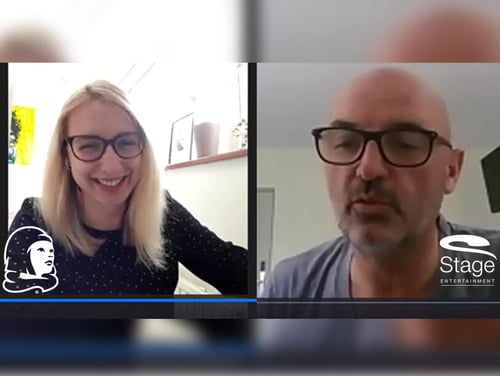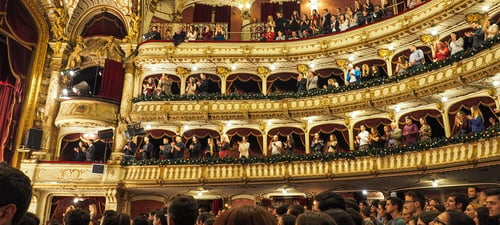
Interview with Eric Loustau-Carrere from Stage Entertainment
Stage Entertainment is an international theatrical production company with theatres in the Netherlands, Germany, Spain, France and Italy.
Their venues frequently welcome some of the world’s most iconic shows, including the likes of Tina, Ghost, Mamma Mia!, Aladdin and The Lion King.
As part of our Sector Spotlight series, our Head of Strategic Accounts, Rita Hinterleithner, sat down for a chat with Eric Loustau-Carrere, Executive Producer of the Théâtre Mogador in Paris.
Having worked with Eric and his team on a number of successful projects, Rita was eager to learn more about Eric’s history in the theatre, how the pandemic has affected the sector, and what he thinks the future holds.
The significance of translation in crafting musicals
Eric, we’ve been honoured to work on a number of iconic musicals with you, including Chicago, Cats, Grease and your upcoming show The Producers (Les Producteurs), which is due to open early next year at Théâtre Mogador.
First of all, how important is the translation element in producing your musicals?
Translation is so key to the process. At a practical level, it is necessary to perform translation (from the original to French) and then a separate, literal backtranslation from the French text to back to English (we send this to the original writers to get their approval, so they know we’re not changing anything vital).
But the translation side is arguably even more valuable from a creative perspective. When you translate the text, you get to delve deep into the meaning of the original, think about why certain words have been chosen, and what the intention really is. Essentially, this phase, which is only happening because the show is being put on in a new country with a different language, is this amazing way to get to the essence of a show; to really investigate its meaning.

What do you seek in a good translator?
Your shows have been translated into a variety of languages. What do you seek in a good translator?
Well, a good track record is a good start. I believe you were working with our London team first, and they recommended you to us!
But mainly, and this is why we love working with Guildhawk, quality is paramount. The extreme quality of what you do is why we work with you time and again. And this is not an easy exercise. It’s very well done!
Secondly, you are getting the work done so fast! This is important for us, with so many different phases and moving parts in the production process.
Common challenges faced by theatres adapting international productions
Thank you! That’s so great to hear! We love working on these creative projects! You mention the production process, and its many moving pieces; what does that look like exactly? And what are the common challenges faced by theatres adapting international productions?
Well, the very first thing we do is get the translator/adapter working on creation of the French script. Then we review the French script with the team, decide whether this is the right direction, etc.
We then get some singers together – one male; one female – and have them sing all the songs; just a piano and vocal run-through. This is an opportunity to see what’s working and what’s not – in terms of wording, sounds, rhythm, etc. and to “clean” the songs up as we go.
Then we do the backtranslation, and send the resulting English to the authors for their approval and comments. There is then usually a round of corrections. And while all of this is going on, the songs are being put in the score to create the piano vocal for the singers and the orchestra.
There are numerous rounds of changes from here – during recording, during rehearsals, and so on. A musical is a living thing, so it is being changed all the time.
So, this is why each phase needs to happen smoothly, as delays have a knock-on effect on the whole process, and the show’s got to be ready on Opening Night!
The challenges of moving the piece into another language are a whole other story. When going from English to French, in particular, the text tends to become longer. So you need to find clever solutions to ensure it still works. This is why we often change notes, rhythm, etc. – to make sure the music and the language connect as well as possible; to make sure the French word sounds right within the melody.
Sometimes, when you read the text on the page, everything looks great, and it’s not until you start singing it that you realise something doesn’t sound quite right.
Initiatives during the pandemic
It’s been a difficult time for theatres and the arts during the pandemic. We have seen your teams busy working on various initiatives, such as designing masks for charitable organisations. What have you discovered during this time that you will be continuing with in the future, because you think they are particularly effective ideas, useful for team bonding, etc.?
There have been a few practical changes, borne out of necessity in strange circumstances, which work better for everybody, and will be kept. For instance, prior to the pandemic, we would receive PDF versions of the script, so all changes had to be made manually. Now that we are cooperating remotely, our copyist is creating this in a new, editable version, so we can make changes much, much quicker.
There has also been a boom in training – across all areas of the theatre. Everyone wants to be doing what they can with their time, so we will all benefit from that long-term.
Mostly, though, what we have learned is the importance of connection. The essence of our type of work is to meet up and be connected. And we can’t do that at the moment, which has been incredibly difficult for everyone. This is the first time in a very long time that everyone in our sector has had to just stop. Even during a war, you can put on cabarets, etc.
You can’t do that with the pandemic. So all these online meetings have been essential (I am in them all day, every day). Same for the constant emails; trying my best to keep people updated, even at a point when I really had no information myself. We have really needed at least this level of connection – even just as humans; we are social animals after all.

You have been in production all your life. What has been your proudest moment?
There have really been two main parts to my professional life. I began as a lighting designer when I was a teenager, with this becoming a full-time job in my early 20s. Around that time, I was also producing shows with friends on the side. The latter – production – then became my passion, and my full-time career from there.
I’ve also done a lot of design work around the world, from theatres to big tops, to full complexes in Macao. But when I got the call about a job back in Paris, working on great shows, and with the international aspect to the work, I was more than happy to move back.
So your question about my proudest moment is kind of a funny one. Having worked on so many large projects and shows, with big names and big money, my proudest moment is, arguably, quite a small one, but I’m absolutely sure of it. As a producer, your greatest challenge is to build a good team. That’s, without a doubt, the greatest pleasure of my job; when I succeed in building a good team. I received a visit from the wife of a head of a technical department I was working with, a number of years ago.
She had come to thank me, because the work I had been doing with her husband was changing him (for the better). This particular department head had previously gone relatively unnoticed. I had started really pushing him, and helping him, and we had been working together.
And because of that experience, he grew, and was able to go out and begin a new project he was excited about! That’s the important stuff – to be able to pass something on; help people to grow. So that conversation was definitely my proudest moment!
The future of Stage Entertainment
What does the future hold for you and Stage Entertainment?
I want to be able to run more productions in France. Next year is a very interesting year for us, because we are doing The Lion King, which is a very big machine indeed. And, at the same time, we will be putting on The Producers, which almost nobody in France has ever heard of! I’m excited to see what our French team can do with what is a very US show.
So this is a big challenge – to open people’s minds to a totally new production. It is also the first show we are creating 100% within Paris, so I would love to do more shows like this in the future.
